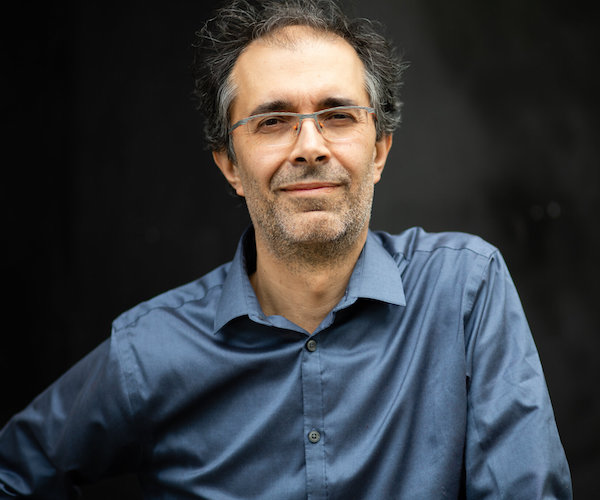Jazz Album Review: Pablo Ablanedo’s “Chistreza” — Rhythmic Bounty
By Michael Ullman
Every piece here seems to play by its own rhythmic rules, and yet nowhere does the music sound academic or formal.
Pablo Ablanedo, Chistreza, featuring Anat Cohen, Jenny Scheinman, Chris Cheek, Jerome Sabbagh, Diego Urcola, Ben Monder, Fernando Huergo, Franco Pinna, and Daniel Ian Smith. (Newvelle Records)

Pianist Pablo Ablanedo. Photo: Anna Yatskevish.
The title cut of Chistreza, this Newvelle octet session led by Argentinian-born pianist Pablo Ablanedo, appears in its midpoint, the first number on the second side. To misuse T.S. Eliot, this track sits at the placid center of the still point of the turning world. The rest of the session dances around the whirlpool of repetitive and hypnotic quiet the composition sets into motion. “Chistreza” begins with a buzzing from the muted trumpet of Diego Urcola, who spends most of his time holding long tones over the trilling guitar of Ben Monder. After what seems an indefinite time in one place, either Monder will change the chord he is relentlessly arpeggiating or, occasionally, Urcolal will introduce a new pitch. There’s a slight increase in intensity when the trumpet plays a little phrase or two rather than a single held note. This is a slow, balanced movement with no clear objective in sight.
It’s an interesting center for an album that never becomes raucous or overstated; the tracks luxuriate in relaxed, sweetly melodic lines performed over a wide variety of rhythms and rhythmic devices. The session has an all-star cast. Its first number, “La Señal,” begins with a simple thud on tom-tom followed by a scratching sound. Then the drum plays two beats and then three and then back down to two again. At least that’s how I hear it, and the pattern continues throughout the entire piece. Next, over this percussion pattern the clarinet of Anat Cohen plays a slow-moving, folksy melody. The other musicians gradually join in until first violinist Jenny Scheinman solos. She is joined eventually by the other horns playing the melody: it’s a procedure that’s often used by swing bands. Then saxophonist Chris Cheek solos in turn. The overall effect of the tune is refined, restrained, even — given the way trumpeter Diego Urcola plays — stately.
Elsewhere Ablanedo likes, it seems, to mix things up, rhythmically and even in terms of mood. “Plaisantriste” (in English something like “Pleasant-sad”) is, as I hear it, a composition made up of several parts, most given over to clarinetist Cohen. It begins with a wistful melody played first in a fragmentary way by pianist Ablanedo and then expanded upon. With some abrupt stops built in, the band takes up this melody and its extensions. Then everything halts and Cohen enters with an eerie series of lines over (at first) electric bass. I guess what’s being evoked is a gratifying sort of sadness, not a series of melancholic moods. One would expect some sort of hijinks in a piece entitled “Bipolarius”: the joke is that the nervous lines that go up at the start of the piece go down at the end, or at least run off in different directions. “Ti Mi Do” is based on those pitches in a scale, chosen because together they spell timido, or timid. Scheinman emerges slowly from the ensemble, playing low notes that remind me of a child peeking out from behind a parent’s legs. The most exuberant piece here — again, given its own distinct rhythm — is “Winter Variations.” The two saxophonists, Chris Cheek and Jerome Sabbagh, duet with Monder, who weaves his lines between and around them. Every piece here seems to play by its own rhythmic rules, and yet nowhere does the music sound academic or formal.
Now living in Cambridge, MA, Ablanedo first recorded as a leader in 2001. His From Down There from that year also featured Scheinman and Cohen. That longtime familiarity with these musicians may be a key to the nature of his new recording and its success. The music is rhythmically and sometimes structurally complex; it’s always melodically satisfying. Making it all work depends on the restraint of musicians who are able to hold delicate balances in place. Many of the players here are bandleaders themselves. They move into Ablanedo’s world gracefully; there are no displays of ego or even examples of rash virtuosity. The rhythm section — Fernando Huergo on electric bass, Franco Pinna on drums, and Monder on guitar — deserves special mention for the unassuming way they play different patterns. Ablanedo must be a persuasive, as well as a talented, man.
Michael Ullman studied classical clarinet and was educated at Harvard, the University of Chicago, and the U. of Michigan, from which he received a PhD in English. The author or co-author of two books on jazz, he has written on jazz and classical music for the Atlantic Monthly, New Republic, High Fidelity, Stereophile, Boston Phoenix, Boston Globe, and other venues. His articles on Dickens, Joyce, Kipling, and others have appeared in academic journals. For over 20 years, he has written a bi-monthly jazz column for Fanfare Magazine, for which he also reviews classical music. At Tufts University, he teaches mostly modernist writers in the English Department and jazz and blues history in the Music Department. He plays piano badly.
Tagged: Anat Cohen, Ben Monder, Chistreza, Chris Cheek, Daniel Ian Smith, Diego Urcola, Fernando Huergo, Franco Pinna, Jenny Scheinman, Jerome Sabbagh, Newvelle Records
